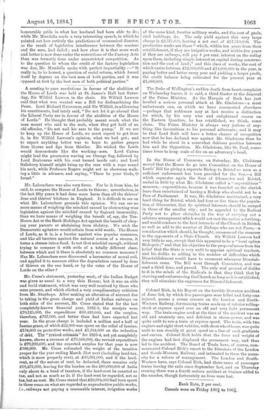Mr. Cross's statement, yesterday week, of the Indian Budget was
given as usual to a very thin House ; but it was an able and lucid statement, which was very well received by those who were present, and which elicited a very complimentary criticism from Mr. Stanhope. After making an alteration of account due to taking in the gross charge and yield of Indian railways on both sides of the account, Mr. Cross stated that for the last completely-known financial year, 1882-3, the receipts were 2701125,000, the expenditure £69,418,000, and the surplus, -therefore, £707,000, and better than had been expected last year. In the gross charge is included a million and a half of famine grant, of which 222,000 was spent on the relief of famine, £134,000 on protective works, and £1,344,000 on the reduction of debt. The "revised estimate" for 1883-4, not yet completely known, shows a revenue of £70,568,000, the revised expenditure is 270,200,000, and the expected surplus for that year is now £368,000. Mr. Cross estimated the weight of the taxation proper for the year ending March 31st next (including land-tax, which is more properly rent), at £40,361,000, and if the land- rent, as of the nature of rent, be deducted, there remains only ft8;473,000, leaving for the burden on the 200,000,000 of India only about 4.s. a head of taxation, if the land-rent be counted as tax, and not so much as 2s. if the land-rent be regarded, not as tax,hat as rent. Mr. Cross stated that £20,094,000 had been spent in three years on what are regarded as unproductive public works, i.e., railways not paying a reasonable interest, irrigation works
of the same kind, frontier military works, and the cost of gaols, civil buildings, &c. The only yield against this very large charge is £2,575,000, leaving a net cost of £17,519,000. The productive works are those " which, within ten years from their establishment, if they are irrigative works, and within five years if they are railways, will pay 4 per cent. interest on the outlay upon them, including simple interest on capital during construc- tion and the cost of land ;" and this class of works, the cost of which varies between £12,000,000 and £14,000,000 in the year, is paying better and better every year and yielding a larger profit, the credit balance being estimated for the present year at £1,088,000.


































 Previous page
Previous page